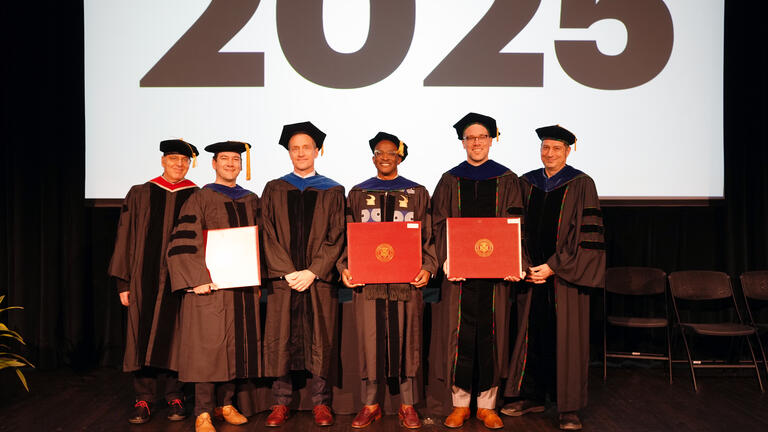Celebrating the Work of Our 2025 PhDs in Transition Design

Carnegie Mellon University's School of Design is proud to announce our three new PhDs in Transition Design. Our latest cohort, consisting of Fas Lebbie, Alexander Polzin and Matthew Wizinsky, represents a fascinating array of thought, work, and research in the field of Transition Design.
"We’re lucky to work alongside such inspiring people—designers who don’t just critique the world as it is, but design toward what it could be," said Professor Jonathan Chapman, Director of Doctoral Studies at the School of Design. "Transition Design demands both vision and humility: the ability to hold complexity, to work across multiple levels of scale, and to lead change that truly matters. Our graduates embody all of that. We’ve learned from them, grown with them, and now proudly send them out into the world to do the important work only they can do."
"Our PhD program shapes sustainability leaders—not just through the research, but through the people themselves. Their clarity, courage, and care make real change possible. Being around people this committed to making the world better is deeply inspiring; we are grateful for their devotion to the work."

Dr. Fas Lebbie's dissertation, Mineral Choreographies: Designing Transitions for Mineral Trajectories for Dynamic Africa, examines the unsustainable trajectories of current extractive systems and investigates how specific ontologies shape them, focusing on the role of design in mineral choreography across extraction, production, consumption, and disposal. Drawing from African Decolonial Theory, Ontological Design, and Systems Design, a mixed-methods, place-based, and liberatory research methodology is employed across artisanal mining communities in Sierra Leone and consumption sites in American cities. The study introduces the concept of "mineral choreographies" to expose detrimental practices and develops a novel analytical tool, "Minerality at Scale," to diagnose and design symbiotic interventions across a mineral's choreography.
Lebbie's research argues for a post-extractive design praxis that reimagines resource relationships beyond extractivist paradigms, offering theoretical insights and practical tools for reshaping extractive practices and advancing understanding of design's role in mineral choreography. By adopting a decolonial epistemological framework, the study shows the potential of design to foster more just and sustainable resource futures in de-emphasizing neo-extractivist models and re-centering local African agendas in conceptualizing socio-ecological and economic transitions. The work uncovers opportunities for alternative configurations for conviviality in crafting transition pathways through resource decolonization and decentralized, community-driven resource infrastructure. The transdisciplinary approach seeks to activate phase transitions that focus on holistic well-being, bridge economic disparities, and promote regenerative practices for African communities to thrive beyond extractivism.

Dr. Alexander Polzin's dissertation, Gross Habituations: Designing Human-Forest Interactions that Break the Heart, notes that the digitalization of forests is reshaping how humans interact with the world, often reinforcing the same harmful practices that have historically damaged ecosystems, while further distancing people from their environment. However, just as digital tools increasingly design the world, they might be (re)designed for the transition to a more sustainable world. Brechtian interactions, or, interactions that figuratively break the ‘fourth wall’ within digitally-mediated human-forest interactions, offer one such avenue for affording critical reflection upon one’s relationship with the more-than-human world while providing the scaffolding to build meaningful and sustainable relationships across multiple scales.
Polzin's dissertation investigates how digital technologies might be designed to foster sustainable human-forest relationships; it does this through case studies of the uneven digitalization of the Great Lakes forest and the traditional ecological knowledge of the Anishinaabe, a material flow analysis of wood within the Great Lakes region, and, through primary research into the design and use of plant identification apps. It adds urgency to calls for designers to design with the more-than-human world and argues for the need to create space for individuals to form both critical and meaningful connections between themselves and the environment.

Dr. Matthew Wizinsky's dissertation, Design & Postcapitalist Desire: Designing for Social Practices Toward Postcapitalist Livelihoods, aims to contribute to the field of Transition Design and how it can be applied to poscapitalist society. Over the past decade, political polling has repeatedly found that a majority of young people in the United States no longer support capitalism. While the reasons may vary, there is no widely held, coherent vision for an alternative system. Economic and social theories on degrowth suggest the potential for a radical restructuring of society, but these tend to operate at a very high level of abstraction. They typically neglect the domain of everyday life, making postcapitalist life hard to picture.
Transition Design takes everyday life as a potent site for systemic transitions, proposing design as a potential catalyst. Capitalist societies have long instrumentalized design practices for developing desirable consumer goods and commodified services. However, there is potential for change. Contemporary design practices, specifically user experience (UX) and service design, have become increasingly non-material, thus “social.” They are practices for crafting value-making interactions between individuals or groups of people, between people and institutions, and between people and information. Transition Design scholars claim the need for designing toward a new economic paradigm, yet there are limited accounts of what “new ways of designing” might support this ambition.
The research begins by uncovering particular ways designers express aspirations for social and ecological impact through their work and, consequently, how these aspirations are stifled by dominant economic models and constraints of the institutions in which they practice. Wizinsky develops a Spinozist conception of desire that reframes designers’ frustrations and rejections of capitalism into an affirmative, animating force: “postcapitalist desire.” He assesses postcapitalist themes from wide-ranging cultural, economic, technological, and philosophical scholarship, bringing them into conversation with design practices. By doing so, he operationalizes theories on community economies, commons-based peer production, needs satisfaction, and solarpunk, creating new tools, methods, and approaches for designers to actualize “postcapitalist” modes of designing.
"Producing research at this level takes immense focus and motivation, but it also requires the ability to stay grounded under pressure, to work generously, and to treat others with respect even in the most intense moments," added Chapman. "Our PhD researchers model this kind of leadership every day, and they carry it forward into the world."
"They are an example to us all."